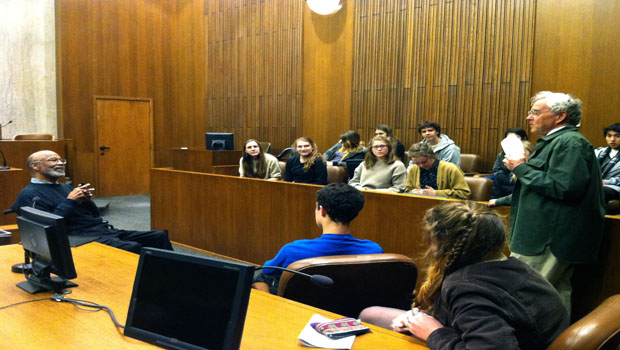Students from Dan Murphy’s Constitutional Law Class got a rare chance to meet a living legend when they visited Thelton Henderson, a federal judge who worked with Martin Luther King, Jr., and has fought civil injustices for decades.
Richard Lautze, an Urban math teacher, joined Murphy’s class on the Feb. 14 trip. “It was an honor to be able to meet with a man of such integrity,” said Lautze. “Judge Henderson’s … gracious and thoughtful demeanor was very moving. I thought his respect for the Urban students was also wonderful to see.”
Althea James (’11), a former student in the Constitutional Law class, says, “I e-mailed (Henderson) after we visited, just because he was such a calm, well-spoken, and thoughtful person. It made me feel good to know that a man like that was at the head of our court system… When I see somebody like Mr. Henderson – he is so smart, so invested – it makes me see that there are people who are involved in the system because they believe in it.”
Thelton welcomed Urban students into his courtroom to discuss his time as one of two African American students at UC Berkeley’s Boalt Hall, his role as the only African American in the justice department during the civil rights movement, and his landmark prisoner and dolphin rights cases.
“I found myself just out of law school, hanging out with Martin Luther King, (Jr.),” says Henderson, of his years as a member of the Justice Department. “I was at a rally with lots of famous black entertainers and saw little black kids from rural areas giving their money and (I) thought, ‘I can’t just sit here without giving money.’ So I stood in line for a while, but then as I got close to the stage, I realized I couldn’t give money because it would be on the front page of the paper. People would say ‘He’s not a government agent, he’s a civil rights activist.’ It wasn’t my place.”
In 1995, Henderson ruled on a case regarding the abuse of prisoners and lack of sufficient health care at Pelican Bay California State Prison in Crescent City. “Over 12 years, I’ve tried to upgrade the prison health system,” said Henderson. He faced a major obstacle as prisons resisted implementing the proper remedies for the issues.
Henderson equated this issue to the fallout of Brown v. Board of Education, the landmark civil rights case. He said that even when judges lay out clear reforms, ingrained practices are tough to eliminate.
According to Henderson and “Soul of Justice,” a documentary viewed by the Constitutional Law class about his career, the prison guards had long regarded using force against prisoners as a way of giving them what they deserved.
After more than a decade, Henderson’s persistence has caused a major transformation in California’s prison system.
In the 1980s, Henderson took on the fishing industry after receiving a case regarding the killing of dolphins in the process of catching tuna. Environmental advocate groups claimed that hundreds of thousands of dolphins were drowning in the nets used to catch tuna because companies were ignoring safety regulations.
This occurred because tuna tend to swim in large groups underneath pods of dolphins. In order to catch them, fishers would surround the entire pod and school with a net inside the water. However, unlike the fish, the dolphins needed to breath air. Caught in a net still submerged in the ocean, they were unable to reach the surface and drowned before the net was lifted into the boat.
The cost-efficiency of this strategy created strong trade paths between Mexico and the United States. The government was reluctant to put this in danger by supporting increased dolphin safety measures.
Despite dissenting efforts during the terms of both Bill Clinton and George W. Bush, Henderson found in favor of the environmentalists and demanded that dolphin safety regulations be tightened and implemented with more oversight.
Just before this decision was handed down, many companies sent fishing boats out to sea in anticipation of the new regulations. “I took on the power I had. I told the helicopters to call the boats back to shore,” said Henderson. Henderson said that over time, “you discover you have power in some areas as a judge and not in others, and you have to use the power you have.”


